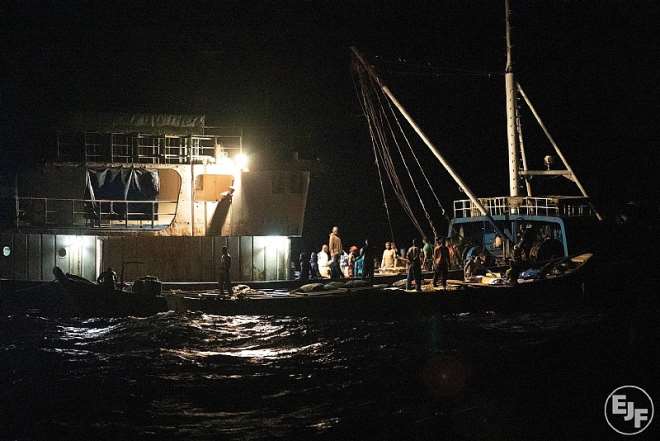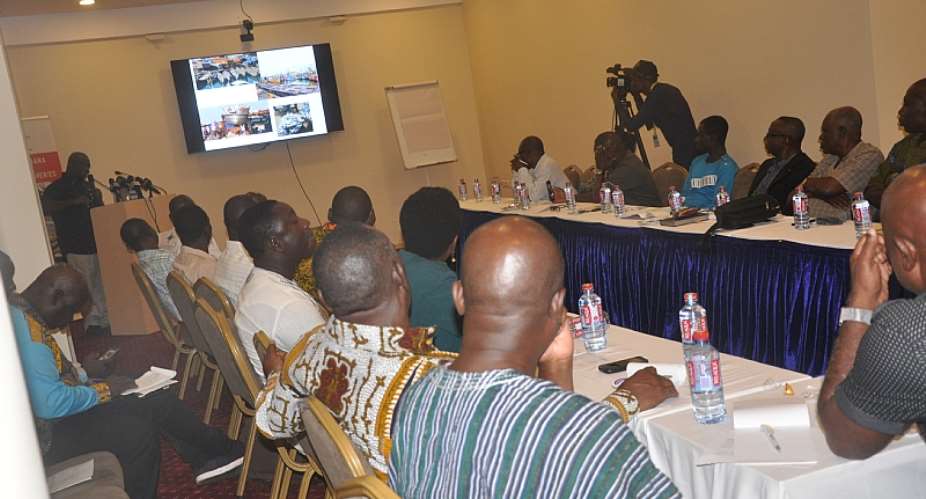‘Saiko’ is a severely destructive form of illegal fishing, where foreign trawlers target the staple catch of canoe fishers and sell this stolen fish back to local communities at a profit.
For the first time, a new report has estimated the true cost of saiko to Ghana’s people and its seas. In 2017 alone this trade stole around 100,000 tonnes of fish, costing Ghanaians tens of millions of dollars in revenue and threatening coastal livelihoods, the report shows.
The report , written by the Environmental Justice Foundation (EJF) and Hen Mpoano, uses film shot at sea , first-hand monitoring at ports and data analysis to reveal the full catastrophic scale of this form of organised crime.
In 2017, approximately 100,000 tonnes of fish were landed through saiko. This means just 40% of trawler catches were landed legally that year.
The trawlers themselves are run almost exclusively by Chinese operators, who use Ghanaian ‘front’ companies to bypass laws forbidding any foreign ownership or control of industrial trawl vessels flying Ghana’s flag. EJF has revealed that over 90% of industrial trawl vessels licensed in Ghana are linked to Chinese ownership.
These industrial boats are able to hoover up vast quantities of ‘small pelagic’ fish such as sardinella – the main catch of the local canoe fishers and a crucial part of the Ghanaian diet. Unless ambitious action is taken, scientists estimate that these stocks could last less than six more years .
In addition, much of the saiko catch is juvenile fish – over 60% of fish analysed from October 2018 - April 2019, the report found. Harvesting at this early stage can severely impact the capacity of Ghana’s fish stocks to recover and replenish.
The saiko catches in 2017 were worth US$ 40.6 - 50.7 million when sold at sea, and US$ 52.7 - 81.1 million when sold at the landing site, the report estimates. Much of this money passes straight into the hands of the Chinese fishing companies, and out of Ghana.
Saiko also causes job losses. The specially built ‘saiko canoes’– that take the fish from the trawlers back to ports such as Elmina – carry 450 times the average catch of the fishing canoes and are operated by only a few individuals. The report calculates that while canoe fishing offers direct employment for around 60 fishers for every 100 tonnes of fish, saiko means only 1.5 jobs per 100 tonnes – 40 times fewer.
“Saiko is precipitating the collapse of Ghana’s staple fish stock and with it, poverty and hunger for its people,” said EJF’s Executive Director Steve Trent.
Steve Trent continued, “Chinese trawlers are making millions of dollars in an illegal trade which makes up over half of the fish caught by the industrial boats. This is an ecological and humanitarian crisis. However, it is absolutely clear that the Government has the ability to stop this illegal and highly damaging activity now and it must act to do so without delay.”
Director of Hen Mpoano Kofi Agbogah says: “Saiko is sucking the heart out of Ghana’s fisheries. The incomes of small-scale fishers have dropped by as much as 40% in the last 10-15 years, and Ghana is now forced to import more than half of fish consumed. Trans-shipments of fish at sea are notoriously difficult to monitor, even with the most advanced systems in place. Instead, all catches should be landed in authorized ports and recorded in official statistics. This would also ensure compliance with fishing-gear restrictions that prevent trawlers from targeting small pelagics.”
Over two million people depend on Ghana’s marine fisheries for their livelihoods. Ghana’s fishing communities have increasingly called for an end to the saiko trade, including in a recent press conference held by the Ghana National Canoe Fishermen Council, the association representing the interests of small-scale fishers.
Each year, the government supports the artisanal fishing sector with around US$ 44 million in premix fuel subsidies, a figure set to increase. By allowing saiko to continue, the government risks overseeing the collapse of the artisanal sector because of the activities of the foreign-owned trawl fleet.
Environmental Justice Foundation (EJF)






 Lay KPMG audit report on SML-GRA contract before Parliament – Isaac Adongo tells...
Lay KPMG audit report on SML-GRA contract before Parliament – Isaac Adongo tells...
 Supervisor remanded for stabbing businessman with broken bottle and screwdriver
Supervisor remanded for stabbing businessman with broken bottle and screwdriver
 NDC watching EC and NPP closely on Returning Officer recruitment — Omane Boamah
NDC watching EC and NPP closely on Returning Officer recruitment — Omane Boamah
 Your decision to contest for president again is pathetic – Annoh-Dompreh blasts ...
Your decision to contest for president again is pathetic – Annoh-Dompreh blasts ...
 Election 2024: Security agencies ready to keep peace and secure the country — IG...
Election 2024: Security agencies ready to keep peace and secure the country — IG...
 People no longer place value in public basic schools; new uniforms, painting wil...
People no longer place value in public basic schools; new uniforms, painting wil...
 'Comedian' Paul Adom Otchere needs help – Sulemana Braimah
'Comedian' Paul Adom Otchere needs help – Sulemana Braimah
 Ejisu by-election: Only 33% of voters can be swayed by inducement — Global InfoA...
Ejisu by-election: Only 33% of voters can be swayed by inducement — Global InfoA...
 Minority will expose the beneficial owners of SML, recover funds paid to company...
Minority will expose the beneficial owners of SML, recover funds paid to company...
 Prof. Opoku-Agyemang has ‘decapitated’ the NPP’s strategies; don’t take them ser...
Prof. Opoku-Agyemang has ‘decapitated’ the NPP’s strategies; don’t take them ser...
